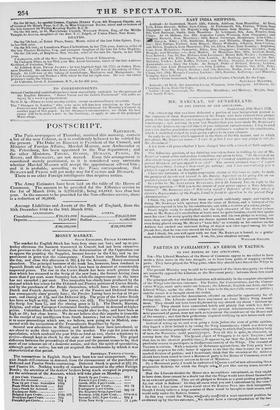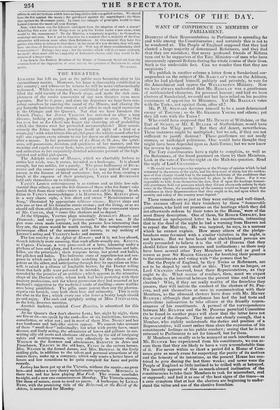PARTIES IN PARLIAMENT: AN ERROR IN TACTICS.
TO TIlE EDITOR OF THE SPECTATOR.
Snt —The Liberal Members of the House of Commons appear to me either to have made a false move in the late struggle, or to have been guilty of napping on their posts. They have played the Whig game, when they should have forced the Whigs to play theirs. The present Ministry may be said to be composed of the Statu Quo party ; to whom arc naturally opposed the Liberals, as the Movement party: between these two stand the Whigs. The principal effect of the late dissolution will ultimately be the complete absorption of tine \\lags into the two extremes. The Tories, the Conservatives, and the Conser- vative Whigs, !nest unite under one banner ; the Liberals, English and Irish, and the Liberal Whigs, under the other. This I take to be theinevitable course of polities ; and the sooner it is brought about the better. The Address, or rather the Amendment, allbrded an admirable opportunity for ef- fecting this. The Liberals should have sanctioned uo Juste Milieu Whig Amend- ment. They should not have been frightened by any absurd cry about " factious op- position." They should have enunciated boldly and plainly that which is a fact- " That the acts of the persons who compose the present Administration, when they were possessed of power, were not such as to:avarrant the coutidence of the Manse and of the country ; and that their professions required verifying by acts helot° such con- fidence could be extended towards them."
Instead of acting up to, and even going a little ;before the state of public opinion, they lagged a little behind it, by voting the NVIlig Amendment; which W,LS drawn up on the vote-catching principle of enunciating nothing to which that:beam-kicking body of men, the Waverers, could possibly object. Now all this is quite. in character, as coming from the Whigs. The /grand ,object of Whiggery is to eject Tory ism; and that, too, in the shortest possible time.= It appears to, me that the .Liberals have no particular reason to participate in thisltnen-ous anxiety of the Whigs. The downfal of Toryism is certain. With a majority of Reformers against them, the Tory party- have evidently no pow er for evil; hence it appears to me that the time is conic for a more marked division of parties; and I do certainly think that the occasion of the Address should have been seized to erect a Movement party in the House of Commons, even at the expense of a temporary reverse in favour of Ministers.
By a Movement party,1 would be understood to:mean a serof men advocating those progressive Reforms for which the People ask.klf you like not my name, invent a better. Had the Liberals divided the House on a no.confidenre amendment, as they ought to have done, there cannot be a doubt but that the Whigs would have found themselves in an awkward position. They are all pledged to Retorm as a great guiding principle. Ay, but what is Reform ? Do they all mean what you and I understand by the term ? I fear not : 1 fear some of them would erect Sir ROBERT PEEL into their interpreter, though I firmly believe a large number of them would be brought to their senses, and would rally under the Reform banner.
In this way would the Whigs, whoreally nonlhold a most unnatural position, be swallowed up by the two extremes._ We should have a virtual dissolution of the two °diens is and' st factions which have so long ridden this tax-galled nation. We should have the few against the many ; the privileged against the unprivileged ; the State Quo against the Movement party. In short, the struggle of principles would he simi. larixed (excuse the word) all over Europe. Now, what harm can the Liberals anticipate from the adoption of such a course: Admitting that some of the Whigs were to juin the Tories under a new name, what would be the consequence? To the Minister, a temporary majority ; to themselves, contempt and ruin. Let it not be forgotten for a moment that a majority of the Con- stituencies will return none other than RelOrmets. At this moment they have two parties who claim to belong to that class; in the event of a new division they will only have one class of Reformers to choose out uf. Will auy of these constituencies elect Conservatives? Perhaps they may; but the number which will do so most evidently be small; there must still be a majority of Reformers chosen, only they would he Re. formers of a deeper tone. I say then to the Radical Members of the House of Commons. St net out from the common herd of the Opposition at once, and try the question of Reform on its naked



























 Previous page
Previous page